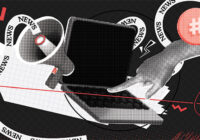A few weeks ago, as I sat at the dinner table eating eggplant parmesan, my aunt asked me a political question: “How do you make sure you listen to what both sides have to say?” I answered her with a laugh, telling her that I watch Fox News from time to time. Her question irked me.
We had been discussing my family’s habit of communicating exclusively through New York Times (NYT) article links, and I had admitted that I inform myself by reading NYT, the whole NYT and nothing but NYT.
I am 16 years old. I identify as a liberal, and I find current conservatism — as redefined by Donald Trump — to be abhorrent. I consider myself relatively politically engaged; I’ve volunteered with congressional campaigns and phone-banked, and I stay on top of the news. I acknowledge that I inform myself through “left-leaning” news sources such as NYT and CNN. I consider these organizations to be heralds of a sort of glorious truth-telling, the white doves of the increasingly partisan delirium that is the American media-scape. But my aunt’s question made me wonder — how can I be sure?
Ideological coddling
I understand, in a purely academic sense, the principle of cross-referencing information across different news sources. Yet, I simply do not have, or care to take, the time to do so. It is more comfortable to accept my knight-in-shining-armor news outlets as correct and dismiss whatever I disagree with as fallacious and deceptive. And it is not just me. A June 2024 study conducted by University of Pennsylvania researchers and published in the Harvard Kennedy School Misinformation Review found that Democrats are generally highly concerned about misinformation and, in consequence, seek sanctuary in partisan media sources. Similarly, Pew Research data suggests that partisan media divides have grown in recent years, largely driven by Republicans losing trust in legacy outlets.
Noah Nye, an 18-year-old high school senior at the Loomis Chaffee School in Connecticut and one of the four first-time voters whom I spoke to, admitted that he only reads NYT. “They’re the single only place I get news from. They may lean liberal, but I personally am fine with that. I think liberal politics in general and the liberal view is mostly correct,” he said. “Where you choose to get your news is, unfortunately, a reflection of your politics these days.”
The same ideology-coddling phenomenon reigns over social media news. “Social media can create a bit of an echo chamber depending on how the algorithm works for you,” said Dawson Kelly, a 19-year-old sophomore at the University of California, Berkeley, whose studies focus on the regulation of social media companies. “It curates only information that you want to see.” Perhaps it is for this reason that so many young people find political sanctuary in social media.
Can Generation Z become savvy voters?
That night after dinner, my aunt and I turned on the TV and flipped to channel 2, CBS News — It was October 1, the night of the debate between Vice Presidential candidates Tim Walz and J. D. Vance. As I listened to Walz and Vance spar, I was underwhelmed — and astounded. There was no squabbling; rather, I found myself listening to a civil, urbane and cordial conversation. The debate was actually focused on politics and policy, not, at last, personality and poison. As I watched, I dismissed the majority of Vance’s well-polished words for what they were: deceit, deception and double-talk. And yet Vance’s disturbing rationality gave me pause. How did I know that what I held as true actually was so? We all think we are smart enough to know when somebody is lying — until we hear Vance tell stories as if they are nothing more than “two plus two equals five.”
As a young person who has grown up in the decade of Trump, I worry that I — and the rest of my generation — have been robbed of the chance to make involved, necessary political decisions. For my whole life, it has always been a political binary of fanaticism versus reason and lunacy versus sanity — Trump versus The Democrat. The choice has been clear. But there will come a day — or at least I hope there will, for all of our sakes — when Trump is gone, and the answers are not so obvious. And I’m not so sure that I or young people will have the shrewdness to make open-minded and truly well-briefed decisions. Politicians are wiley; we must be more so. Are we? Our information consumption says no.
“I feel like [young] people blindly trust social media because they’re spending so much time with it,” said Ava Spinelli, a 19-year-old sophomore at California Polytechnic State University. Spinelli recognizes how duplicitous social media content can be; even still, she admits that she “end[s] up believing a good portion of it.”
And it is not just social media news that young people have a warped relationship with. Spinelli’s roommate, journalism major Caroline Belew, remarked that young people “trust the media [only] to an extent … I feel like [they] have a very toxic relationship with the media. Our generation definitely [doesn’t] access [mainstream media] as much as they should for their news.” And when they do, it is along partisan fault lines.
That night at dinner, my aunt also told me a story. It was the one of her political upbringing. She had grown up in Saginaw, Michigan, and was raised by conservatives. She told me how, as she reached college age and moved out, she had educated and eventually “de-programmed” herself from her parents’ right-wing doctrine.
I began to wonder if I was “programmed” liberal. I’ve grown up in a proudly Democratic household; my dad refers to himself as an “extreme Democrat.” At just ten years old, my brother participated in the January 2017 Women’s March against Trump in New York. At eight years old, I cried at Trump’s electoral victory.
I believe in the Democratic party because I believe in human rights. And yet all this made me wonder: What if everything I think I know is wrong, and I have no idea? What if the other side is right? And while I do not see myself (in the near future, or ever) changing my political morality, these sorts of disconcerting self-doubts are crucial for holding ourselves accountable in an age where the fear factory runs 24 hours a day and the big lie technique has become the playbook of one party, where the informed consent of the people is under siege and democracy cowers on its knees.
The views expressed in this article are the author’s own and do not necessarily reflect Fair Observer’s editorial policy.
Support Fair Observer
We rely on your support for our independence, diversity and quality.
For more than 10 years, Fair Observer has been free, fair and independent. No billionaire owns us, no advertisers control us. We are a reader-supported nonprofit. Unlike many other publications, we keep our content free for readers regardless of where they live or whether they can afford to pay. We have no paywalls and no ads.
In the post-truth era of fake news, echo chambers and filter bubbles, we publish a plurality of perspectives from around the world. Anyone can publish with us, but everyone goes through a rigorous editorial process. So, you get fact-checked, well-reasoned content instead of noise.
We publish 2,500+ voices from 90+ countries. We also conduct education and training programs
on subjects ranging from digital media and journalism to writing and critical thinking. This
doesn’t come cheap. Servers, editors, trainers and web developers cost
money.
Please consider supporting us on a regular basis as a recurring donor or a
sustaining member.
Will you support FO’s journalism?
We rely on your support for our independence, diversity and quality.










Comment